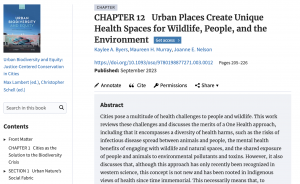
Abstract: Cities pose a multitude of health challenges to people and wildlife. This work reviews these challenges and discusses the merits of a One Health approach, including that it encompasses a diversity of health harms, such as the risks of infectious disease spread between animals and people, the mental health benefits of engaging with wildlife and natural spaces, and the shared exposure of people and animals to environmental pollutants and toxins. However, it also discusses that, although this approach has only recently been recognized in western science, this concept is not new and has been rooted in Indigenous views of health since time immemorial. This necessarily means that, to effectively move One Health forward in urban areas, we must work to meaningfully integrate diverse perspectives and knowledges into this process. This chapter explains how a Two-Eyed Seeing approach integrating Indigenous and western knowledges can be used to create impactful and actionable solutions to intersecting health challenges. It concludes this understanding of the interrelationships between human and wildlife health in cities by centering the need to be intentional of social justice in addressing One Health issues, specifically by applying a harm-reduction lens to the process of promoting wildlife health in cities and acknowledging the needs to consider whose knowledge and perspectives are integrated into this process.
Byers, K.A., Murray, M.H., Nelson, J.E. (2023). Urban places create unique health spaces for wildlife, people, and the environment. In M. Lambert & C. Schell (Eds.), Urban biodiversity and equity (pp. 205-226). Oxford University Press.
The article is available with institutional access via this link.